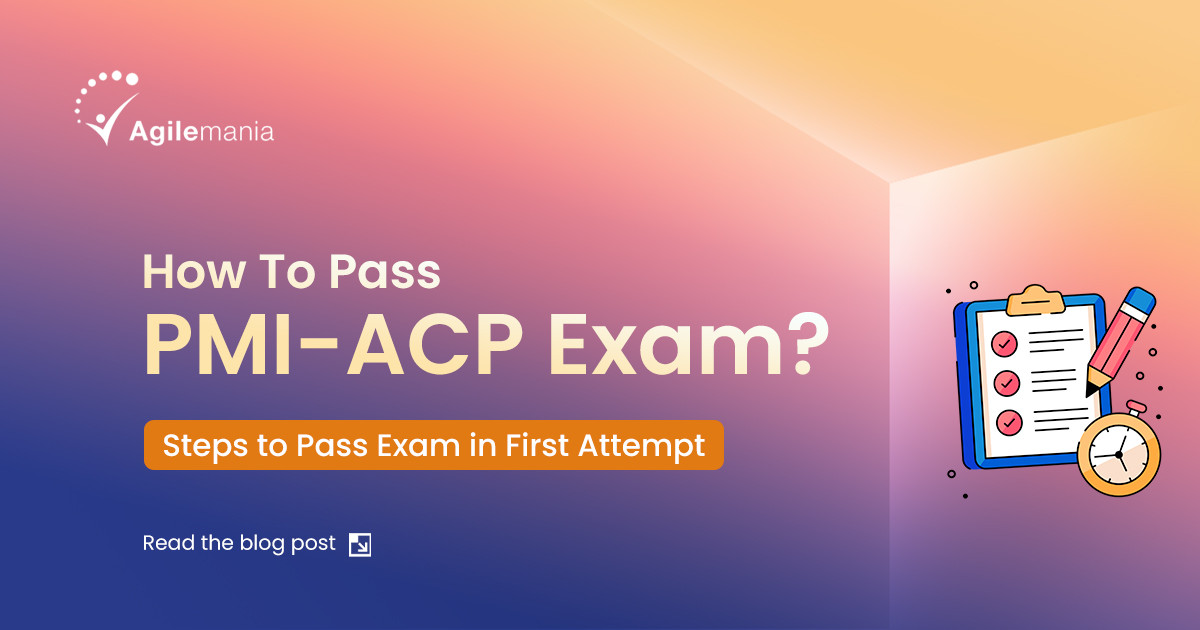
Satyajit Gantayat
Satyajit has broad and deep experience in Agile coaching at the strategic senior executive level wh... Read more
No courses found...
No courses found...

Satyajit Gantayat
Satyajit has broad and deep experience in Agile coaching at the strategic senior executive level wh... Read more

Are you a project manager, team lead, or part of an agile team looking to advance your career?
The PMI-ACP (Project Management Institute Agile Certified Practitioner) certification might be the perfect fit for you.
As organizations increasingly adopt agile practices, there’s a growing demand for professionals who not only understand these methods but can also lead agile teams to success.
By obtaining a PMI-ACP certification, you can demonstrate your expertise in agile principles, tools, and techniques, setting yourself apart from the competition and positioning yourself as a valuable asset to any agile project team.
According to the research, participants who earned certification in the last year saw their salaries increase by 10% to 20%. So, what are you waiting for? Let's get prepared.
However, the question arises of how to get certified as PMI-ACP and, more importantly, what the steps are to clear the PMI-ACP Examination.
In this blog, we will explore how to get certified as PMI-ACP. So, without any delay, let's initiate the process of passing the exam.
The path to achieving PMI-ACP certification requires candidates to meet specific educational and professional experience criteria, including:
Holding a secondary degree (such as a high school diploma, associate’s degree, or an international equivalent)
Completing 21 contact hours of training in agile practices
Having 12 months of general project management experience within the past five years (holding a current PMP® or PgMP® certification fulfills this requirement)
Gaining eight months of experience working on agile projects within the last three years
These prerequisites ensure applicants possess a solid background in project management and agile methodologies before sitting for the exam.
The PMI-ACP exam features 120 multiple-choice questions covering a wide variety of agile methodology topics, such as Scrum, Kanban, Lean, extreme programming (XP), and test-driven development (TDD). Candidates have a total of 3 hours to complete the exam. It's worth highlighting that this exam assesses theoretical knowledge and the practical use of agile techniques in challenging project environments.
Preparing for the PMI-ACP exam can feel overwhelming due to its wide range of topics and the required level of expertise.
However, breaking down the preparation process into manageable steps can make it much more achievable.
A stepwise approach helps you focus on key areas systematically, ensures that you cover all necessary content, and builds your confidence as you progress.
Following a structured plan, you can effectively prepare for the exam, master agile principles, and practice applying them in real-world scenarios.
Here's a detailed look at the essential steps to help you clear the PMI-ACP exam successfully.

The first thing you should do is review the PMI-ACP Handbook. This handbook is an essential resource, offering guidelines and requirements for the PMI-ACP exam. Available online, it’s organized into multiple sections.
The initial section focuses on the best Agile practices that are crucial for effective Project Management and provides guidance on how to implement these practices successfully.
Subsequent sections clearly outline the eligibility criteria needed to take the PMI-ACP exam. There’s also an exam blueprint included, which helps familiarize candidates with the exam format, question domains, and mark distribution.
Furthermore, the handbook details the application process and provides information about the exam schedule.
The final section offers insights into maintaining the PMI-ACP certification.
Overall, the PMI-ACP Handbook is a valuable guide for candidates beginning their exam preparation journey.
The PMI-ACP Examination Content Outline is a comprehensive resource provided directly by the Project Management Institute (PMI) on its website.
This document includes all the key domains and study materials needed to prepare for the PMI-Agile Certified Practitioner exam.
It covers crucial information about Agile tools and methodologies vital for the test.
This content outline can help you avoid the unnecessary bulk of extra study materials in many reference books.
By focusing on the relevant and specific topics outlined by PMI, you can concentrate on the essential information that needs to be understood and memorized, saving time and effort compared to sifting through everything you might encounter.
Numerous accredited institutions offer PMI-ACP certification courses for aspiring professionals.
These programs are tailored to deliver in-depth knowledge of Agile methodology, covering its tools, frameworks, and techniques for application in real-world projects.
Notably, these courses typically last three to five days, making them an excellent resource for those preparing for the PMI-ACP Certification exam.
In addition, these courses feature interactive live sessions, opportunities for clarifying doubts, practice tests, and performance feedback.
Such features enhance learning and support candidates in their preparation journey.
To qualify for the PMI-ACP exam, completing twenty hours of PMI-ACP training and certification is a mandatory requirement. Therefore, pursuing PMI-ACP training is essential rather than optional. However, it’s important to approach these twenty hours of training with full commitment and focus.
In-person training is ideal if:
On the other hand, online training courses offer several advantages:
Practice tests are crucial for self-evaluation. Simply reading study material and memorizing concepts is not enough; you need to test your knowledge to gauge your preparation.
Without practicing, your efforts may not yield the desired results.
There are numerous sources online where you can find PMI-ACP practice questions.
The PMI website itself offers a range of practice questions.
It’s recommended to complete at least 120 to 150 mock tests, ensuring they are current and relevant to stay aligned with the latest trends.
Each practice test typically contains 30 to 50 questions.
After finishing each topic, take a practice test to assess your understanding and reinforce your knowledge.

Networking always helps you connect with your fellow students.
Online discussion boards on platforms like Facebook, LinkedIn, and, increasingly, Discord provide valuable opportunities to interact with fellow candidates and experienced mentors.
These communities allow you to ask questions, share concerns, and gain insights from those who have successfully navigated the exam process.
Engaging with peers who are preparing for the same exam can help you find common ground and exchange study tips, effective strategies, and useful resources.
Many of these forums also include PMI-ACP professionals who can offer expert advice and answer specific queries.
Making the most of these connections—by asking questions, seeking clarifications, and absorbing advice—can significantly enhance your preparation and increase your chances of passing the exam on your first attempt.
The path to earning PMI-ACP certification highlights a professional’s commitment to mastering agile project management.
With a pass rate typically around the 70th percentile, the PMI-ACP exam presents a challenge, but it is certainly within reach with diligent preparation.
Successfully passing the PMI-ACP exam requires extensive study, practical application of agile principles, and a strategic approach to the test.
This guide provides the essential information and strategies to embark on your PMI-ACP certification journey.
By focusing on understanding and implementing agile methodologies, you’ll be well-prepared to excel in the exam.
Best of luck as you work towards becoming a PMI Agile Certified Practitioner.
With the right guidance, passing the PMI-ACP exam becomes easy. Our experienced trainers will help at each step so you can confidently achieve your PMI-ACP credential.
Enroll Now
Having solid experience with Agile before pursuing the certification is advantageous, as it helps you understand and apply Agile principles to different situations.
Preparing for the PMI-ACP exam typically requires 100-150 hours. To complete your preparation on time, plan to dedicate four to five hours each day. Set aside these hours daily to ensure you’re fully prepared.
To meet the minimum requirement for successful completion and qualify for IACET CEUs, learners must achieve an average test score of at least 70%.
Satyajit has broad and deep experience in Agile coaching at the strategic senior executive level while also coaching and uplifting the capability of teams and individuals. An Agile Coach and SAFe® Practice Consultant with more than 24 years of experience.
WhatsApp Us

We will get back to you soon!
For a detailed enquiry, please write to us at connect@agilemania.com

